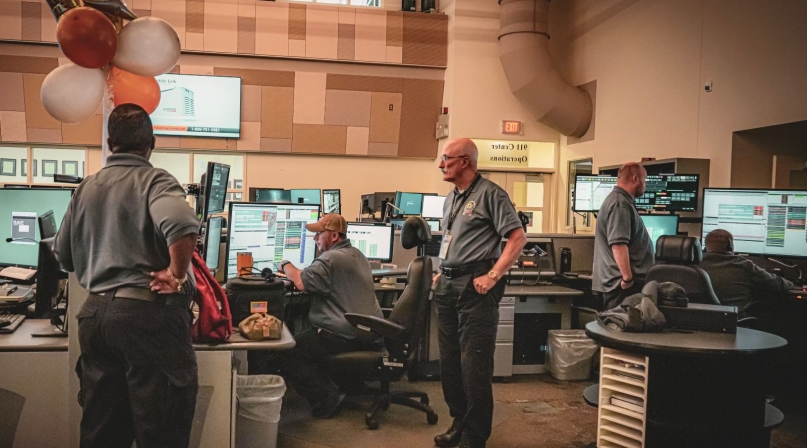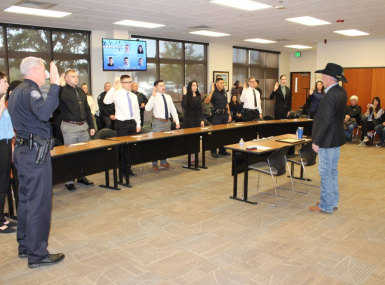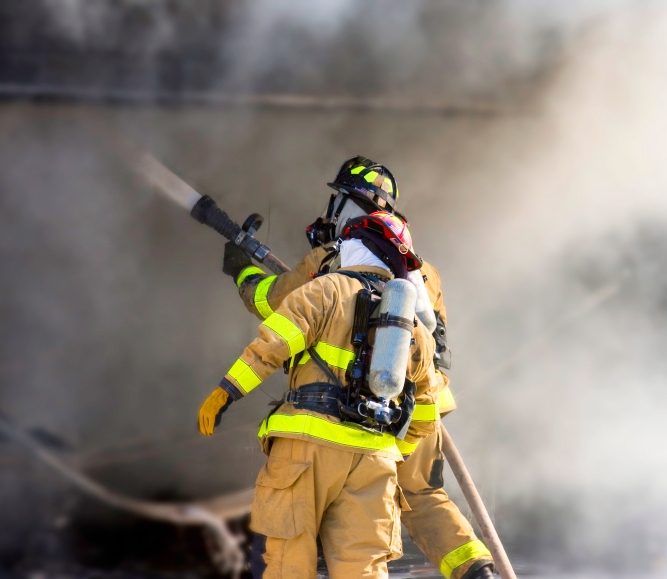Delaware county 911 operator is still a steady voice on the phone after 53 years

Key Takeaways
No matter what’s happening in the New Castle County, Del. emergency dispatch center, John Farrell exudes serenity.
His voice isn’t exactly “sing-songy” while he responds to calls from people experiencing the most stressful moments of their lives, but he speaks a rhythm into his questions and answers that lets callers know that he’s going to be steady and reliable regardless of what they’re facing. An ambulance is already on the way, so whateer he can draw out of the caller helps the paramedics come in with a game plan. Farrell distills a chaotic narrative from the caller into a briefing.
All of this while listening to the rest of the dispatch center out of his right ear and scanning an enormous set of monitors displaying a flood of information. After decades in the business — Farrell just marked 50 years at New Castle County following three years with his native Cecil County, Md. — everything has slowed down from his perspective. He’s in control.
“I have to mask the emotion in my voice,” he said. “I’m trying to get the best answers I can, even if it’s a lie.”
“Callers are extremely stressed in many cases. I just want them to answer ‘yes,’ ‘no,’ or ‘I don’t know.’ It’s OK to not know.”
“Help is on the way, tell me what happened.”
He gives each question a second shot before moving on, steady and focused on trying to pull out any useful information.
“Is she breathing? Is she a normal color or changing color?”
“Is she responding normally?”
“Are you inside or outside?”
“Collect her prescriptions, keep her comfortable until the ambulance arrives.”
The son of an assistant fire chief, Farrell caught the bug listening to radios when he was 12, and by the time he was 18, he was hitchhiking to calls when he didn’t have use of the family car. He still has his finger on the pulse of the county’s emergency response community.
“When I’m not working in here, I’m working on an ambulance,” he said. “It keeps me connected to know what’s going on out there.”
He knows three-quarters of the crews out on the road at any given time.
“That’s why I like working this channel because not only do I know these people — I know their tendencies and I’m pretty good with geography.”
That geography knowledge didn’t come from staring at maps — he has also worked as a sales representative for a bakery and drove many New Castle County roads in the process. The rest he drove on his own, “back when gas was cheap.”
As a 20-year-old in Cecil County’s dispatch center two floors below ground, he simultaneously handled communications for the fire department, ambulance services, the Elkton, Md. police department, the sheriff’s office, the Cecil County Civil Defense dispatch, the State of Maryland Department of Fish and Inland Game and the rape crisis hotline. All on his own.
“It was very difficult at that age to counsel a woman who has experienced something horrible over a microphone,” he said.
Farrell worked a push-button system to manage the different channels in those days, and kept track of everything on paper. After he moved to New Castle County, he was on duty the day the department switched over to 911. Now, aided heavily by a computer system that can route responses, he provides the experienced check on the system. The same way he knew geography by the prefix in a caller’s phone number, the challenge has transformed into making sure a phone call from across the river in New Jersey that connected with a Delaware cell tower doesn’t send one of his precious ambulances off into the wrong jurisdiction.
He and his colleagues already deal with the boundaries of the city of Wilmington, the city of Newark and the University of Delaware campus, all of which operate their own dispatch centers within New Castle County.
Farrell sees no drop-off in demand for emergency response capacity, and it’s not just because of population growth.
In part, an aging population with medical concerns, combined with growing incidences of substance abuse disorder have increased the volume of calls, but the threshold for calling for an ambulance has fallen.
Some, he allows, is generational, recounting when his sister hurt her wrist during a snowstorm when they were children.
“My mother said we should call an ambulance,” he said. “My father asked why and she said ‘Because it’s snowing outside.’ He told her the snow was the same under the family car’s tires as it was under the ambulance’s, and she got it, then.”
Likewise, the proliferation of medical alarm devices has only made his job harder.
“People know if they call 911, they’ll be asked questions, so they get these medical alarms, thinking they can just press them and get faster service,” Farrell said.
“They won’t. This woman in Missouri is probably monitoring burglar alarms, freezer alarms, medical alarms and she’s taking them in the order she receives them. So now we’re sending an ambulance someplace where we have no idea what kind of medical alarm it is, so we go all the way up to the fifth floor for a stomachache and the caller has a phone right next to them.”
Farrell has been a quadruple threat, not just working dispatch and fire crews but also teaching communications classes for emergency dispatchers and serving on the Newark City Council for three terms.
Fifty-three years is certainly long enough for generational differences to become apparent.
“You know who I get the attitude from? People who are a little younger. People my age are used to answering questions. The worst part is when someone wants to show off how much they know. Don’t try to impress me with what you know.”
Farrell finds himself falling into that trap himself though. While on vacation with his family in South Carolina, an experience enticing enough for him to consider retirement someday, he stopped into a local fire station to see how things worked down there.
“They directed me to a T-shirt that said, ‘We don’t care how you do things up north, this is Surfside Beach,’” Farrell said.
"I got the message."
Related News

House passes legislation to increase the Crime Victims Fund
On January 12, the House passed the Crime Victims Fund Stabilization Act (H.R. 909) by a voice vote.

CMS requires state Medicaid suspension upon arrest versus termination
Effective January 1, 2026, federal law now requires states to suspend, rather than terminate, Medicaid coverage when an individual is incarcerated.

ICE hiring surge challenges county law enforcement
Local governments hope that their law enforcement personnel will favor the familiarity of the communities they serve when weighing potentially lucrative immigration enforcement recruitment bonuses, which may require them to uproot their lives.
Resource
Calling 911: Funding and Technological Challenges of County 911 Call Centers

